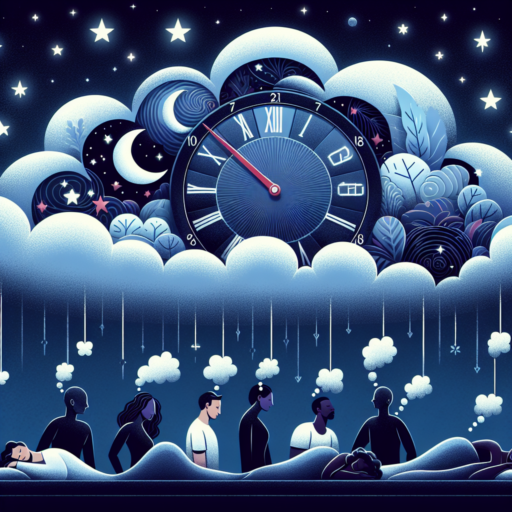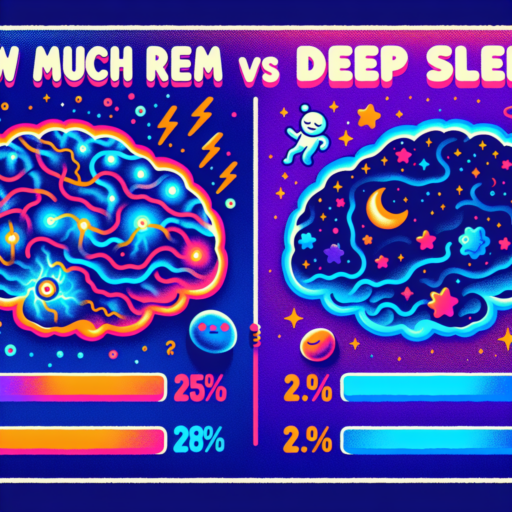What is a healthy amount of deep sleep?
Understanding the healthy amount of deep sleep you need is crucial for optimizing your overall well-being. Deep sleep, the most restorative sleep phase, plays a significant role in memory consolidation, physical recovery, and hormonal balance. Generally, adults should aim for a deep sleep duration that constitutes about 20-25% of their total sleep time each night.
The exact amount of deep sleep one requires can vary from person to person. Factors such as age, lifestyle, and overall health can influence the specific needs. For most adults, this translates to roughly 1.5 to 2 hours of deep sleep per night. It’s important to note that achieving a balanced sleep cycle, which includes adequate periods of both REM and non-REM sleep, is essential for waking up feeling refreshed and rejuvenated.
Maintaining a consistent sleep schedule, optimizing your sleep environment, and adopting a pre-sleep routine can help increase the quality and quantity of deep sleep. Paying attention to these aspects of sleep hygiene can assist in ensuring that you achieve the recommended amount of deep sleep, paving the way for enhanced health and well-being.
No se han encontrado productos.
Why do I get so little deep sleep?
Many factors contribute to why individuals might find themselves getting minimal deep sleep, a crucial phase for physical and mental restoration. Understanding these elements can provide insight into how to improve sleep quality.
Lifestyle Factors
One of the primary reasons for reduced deep sleep involves various lifestyle choices. Consumption of alcohol or caffeine before bedtime, exposure to blue light from screens, and irregular sleeping patterns can significantly impede the body’s ability to enter deep sleep. Additionally, a lack of physical activity throughout the day has been linked to poorer sleep quality.
Stress and Anxiety
Stress and anxiety play a major role in disrupting sleep cycles, including deep sleep. The body’s response to stress can increase heart rate and brain activity, making it difficult to transition into the deeper, more restorative stages of sleep. Practicing relaxation techniques before bed, such as meditation or deep breathing, can help mitigate this effect.
Underlying Health Issues
Finally, underlying health conditions might be at the root of inadequate deep sleep. Sleep disorders like insomnia, sleep apnea, and restless leg syndrome can dramatically affect the amount and quality of deep sleep one gets. Consulting with a healthcare provider to address these issues can lead to improved sleep patterns and overall health.
Is 4.5 hours of deep sleep too much?
When discussing sleep quality and its impacts on health, understanding the role of deep sleep becomes crucial. Deep sleep, also known as slow-wave sleep, is that phase of sleep where the body truly rests and repairs itself. The question of whether 4.5 hours of deep sleep is excessive is quite pertinent, especially in our fast-paced world. Generally, adults achieve approximately 1.5-1.8 hours of deep sleep per night, which accounts for 20-25% of total sleep time. This context sets the stage for a deeper dive into whether spending more time in this sleep phase could be beneficial or if it veers toward the excess.
The importance of deep sleep cannot be overstated, as this phase supports memory consolidation, immune function, and energy restoration. Achieving more than the average span could suggest an enhanced recovery process for the brain and body. However, it raises the question of balance. The sleep cycle is composed of multiple stages, including REM, light sleep, and wakefulness, all of which are vital for a restorative sleep experience. An excessive amount of time in any one stage could potentially disrupt this delicate equilibrium.
In delving into the specifics, individual needs and factors play a significant role. Variables such as stress levels, physical activity, and overall health status can influence how much deep sleep an individual requires. Therefore, while 4.5 hours of deep sleep might seem substantial against the average, for some, it might be just what is needed for optimal functioning. This discussion beckons a closer look at personal health and lifestyle choices to gauge the exact requirements for deep sleep.
Is 32 deep sleep good?
The question of whether 32 minutes of deep sleep is beneficial has garnered attention among sleep researchers and individuals aiming for optimal health. Deep sleep, also known as slow-wave sleep, is a critical part of the sleep cycle that aids in memory consolidation, physical recovery, and hormonal regulation. While individual sleep needs vary, understanding the impact of getting 32 minutes of deep sleep can offer insights into achieving better sleep quality.
Deep sleep plays a pivotal role in overall health, affecting everything from mental acuity to physical well-being. Though the exact amount of deep sleep needed can differ from person to person, experts typically recommend that adults aim for 1 to 2 hours of deep sleep per night as part of their total sleep requirement. In this context, achieving 32 minutes of deep sleep represents a significant portion of this target, suggesting potential benefits for those who manage to attain this level of rest.
However, measuring the quality and not just the quantity of sleep is essential. The efficacy of 32 minutes of deep sleep can be influenced by factors such as sleep continuity, the number of sleep cycles one completes in a night, and the balance between different stages of sleep. Therefore, while 32 minutes of deep sleep might be good, ensuring that it is part of a balanced and uninterrupted sleep pattern is crucial for reaping the full benefits of restorative sleep.




